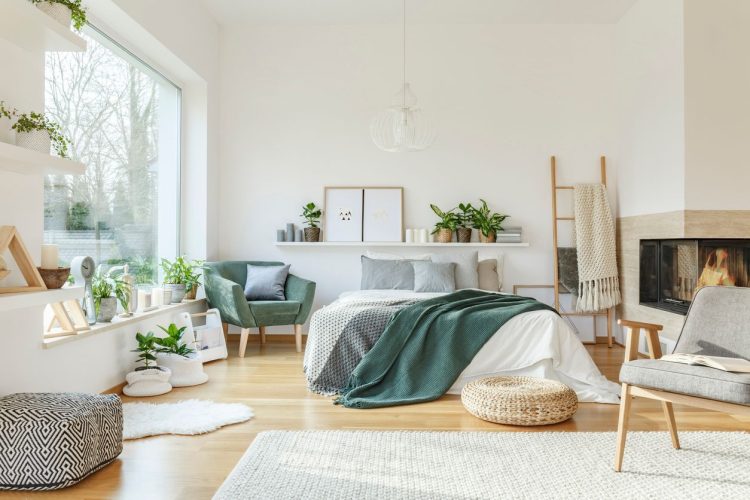Let’s face it. Mornings are not for everyone.
If you tend to hit the snooze button over and over or need a few cups of coffee before you can even entertain starting the day, you’re not alone. But all is not lost. According to interior design expert Zoe Warren at PriceYourJob.co.uk, there are simple changes you can make to your bedroom that can encourage better sleep, make waking up easier, and maybe even boost your mood. Try some of these suggestions to start paving the way to better mornings:
Choose the right colors. It’s probably no surprise that color plays a big part in creating the mood of a room. According to Warren, bright or dark colors can be overstimulating, potentially making it tough to sleep. Instead, stick to shades like soft blue, neutrals and pastels that help soothe the mind. And we’re not just talking about walls—incorporate calming colors with bed linens, accessories, rugs, wall art, etc. for maximum impact.
Declutter. A messy bedroom cluttered with clothes, accessories and knick knacks can increase your stress level and make it harder to sleep. Help your brain shut off at night by keeping things nice and orderly, using decorative baskets, under-bed storage containers and attractive shelving units. Make it a daily practice to keep your bedroom tidy.
Keep it cozy. To create a super relaxing atmosphere in the bedroom, make sure there are plenty of inviting textures, such as plushy blankets and soft rugs. Warm lighting and dimmable bulbs will up the cozy factor when you’re ready to unwind at the end of the day.
Maximize natural light. In order to wake up naturally and feel refreshed each morning, letting natural light into your bedroom is essential. Open curtains and blinds as soon as you wake up to boost your alertness and set your internal clock for the day. Placing your bed near a window will help allow sunlight to wake you up naturally.
Make sure your bed is comfortable. A good night’s sleep requires a quality mattress that supports you at night and helps minimize the aches and pains that make it tough to get out of bed in the morning. Soft sheets and breathable covers will also help ensure you get a good night’s sleep.
Pillows are critical. The perfect pillow means different things to different people, and depends on your preferred sleep position; side sleepers need firmer support, while back sleepers prefer softer pillows, says Warren. Find one that provides the necessary support and that keeps your head and neck aligned.
Keep it comfy. The ideal temperature is essential to sleeping better, and that means your bedroom should be neither too hot nor too cold. Experiment with fans, heaters and cooling pads to help get your bedroom to the perfect temperature for your liking.
Ditch the tech. You’ve probably heard that the blue light from mobile devices, televisions and computers hampers melatonin production—a key hormone that induces sleep. If you really want to wake up feeling well rested, banish your technology to another room for the evening…or at least keep your phone out of arm’s reach. Reading a book or listening to music is a much better way to wind down at day’s end.
Add some plants. Certain houseplants, such as snake plants or pothos, have been scientifically proven to improve the air quality in a room, making it feel fresher and more breathable. This will not only lead to improvements in sleep quality but also create an uplifting environment in which to wake up. Greenery can have a huge impact on your mood and make any space feel more alive and motivating.











